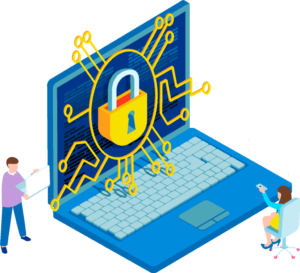Stay Safe Online: A Guide to Cyber Security in the Modern Age

Cyber Security Module
Module Title: Understanding Cybersecurity Fundamentals
Module Description:
This module serves as an introduction to cybersecurity, covering essential concepts, principles, and practices in the field. Participants will gain an understanding of the importance of cybersecurity, common threats and vulnerabilities, security controls and technologies, and best practices for securing digital assets. Through practical examples and case studies, students will develop foundational knowledge and skills in cybersecurity.
Module Objectives:
- Understand the importance of cybersecurity in modern society and business.
- Learn about common cyber threats, attack vectors, and vulnerabilities.
- Explore essential security controls and technologies used in cybersecurity.
- Gain insights into best practices for securing networks, systems, and data.
- Develop awareness of ethical and legal considerations in cybersecurity.
Module Outline:
Introduction to Cybersecurity
- Overview of cybersecurity: definition, scope, and significance.
- Understanding the cybersecurity landscape: threats, risks, and challenges.
- Introduction to cybersecurity frameworks and standards.
Cyber Threats and Attack Vectors
- Overview of common cyber threats: malware, phishing, ransomware, etc.
- Understanding attack vectors and entry points: network, endpoint, application, social engineering.
- Case studies and examples of real-world cyber attacks.
Fundamentals of Cryptography
- Introduction to cryptography: principles and objectives.
- Understanding encryption algorithms, keys, and key management.
- Exploring cryptographic protocols and applications in cybersecurity.
Network Security Principles
- Fundamentals of network security: confidentiality, integrity, availability (CIA).
- Overview of network security technologies: firewalls, intrusion detection/prevention systems (IDS/IPS), VPNs.
- Best practices for securing network infrastructure and communication channels.
Secure System Design and Development
- Principles of secure system design: least privilege, defense in depth, secure by default.
- Understanding secure coding practices and software development life cycle (SDLC).
- Secure configuration management and patch management.
Identity and Access Management (IAM)
- Overview of IAM concepts: authentication, authorization, accountability.
- Implementing access controls: role-based access control (RBAC), multi-factor authentication (MFA).
- Managing identities and access privileges effectively.
Incident Response and Disaster Recovery
- Developing an incident response plan: preparation, detection, containment, eradication, recovery.
- Understanding the importance of backup and disaster recovery (DR) planning.
- Case studies and examples of incident response and recovery processes.
Legal and Ethical Considerations in Cybersecurity
- Overview of cybersecurity laws, regulations, and compliance requirements.
- Understanding ethical hacking and penetration testing.
- Ethical and professional responsibilities in cybersecurity roles.
- 1 to 1.5 Month
- Weekdays : Mon to Fri ( 1hr/day )
- Weekend: 2hrs/day
- Flexible Time
- Free Session Videos
- Course Completion Certificate
- Lifetime Customer Support
- Placement Support
- Resume Preparation




